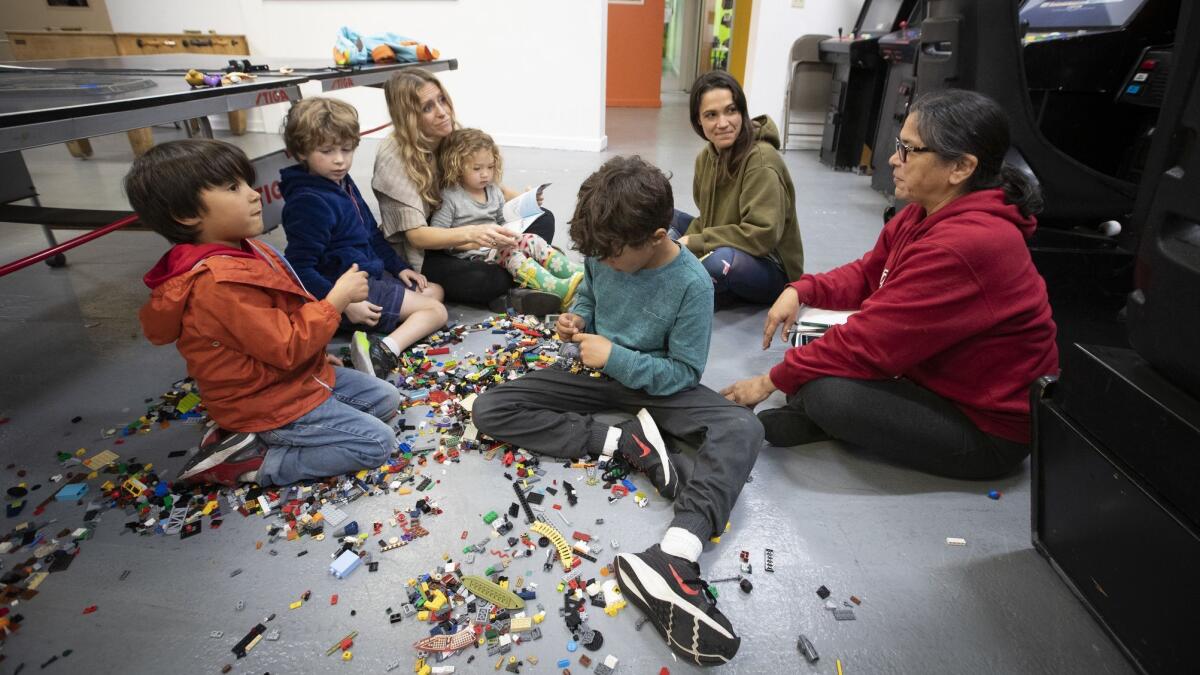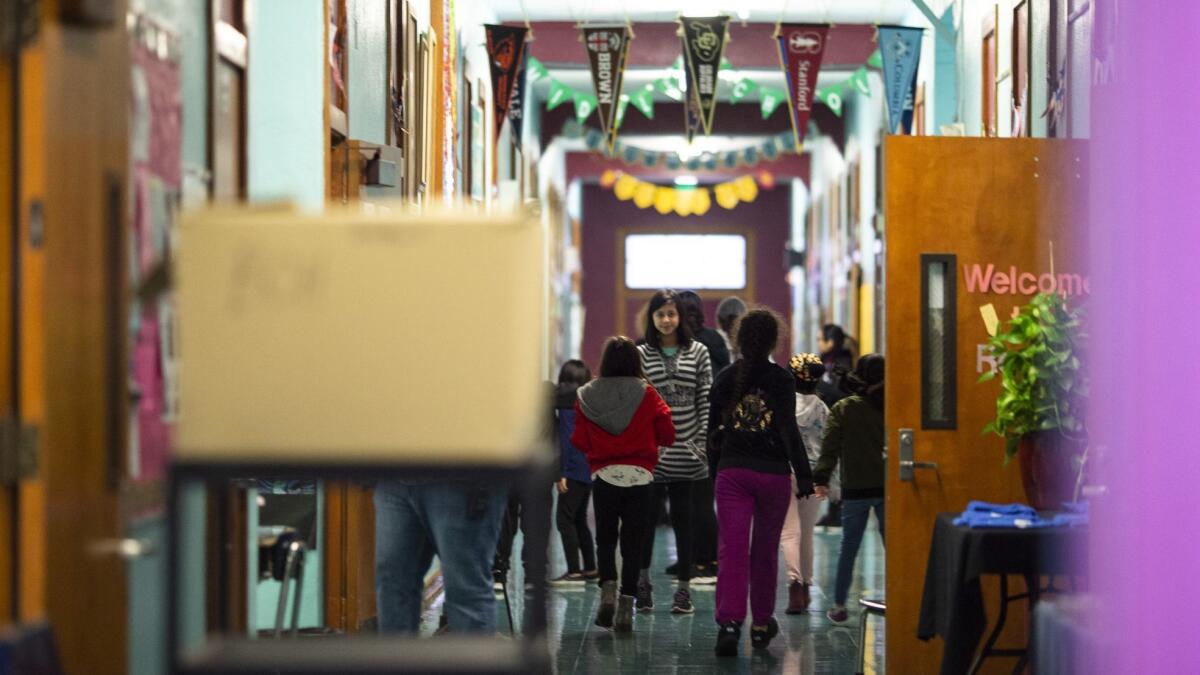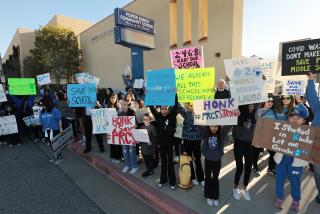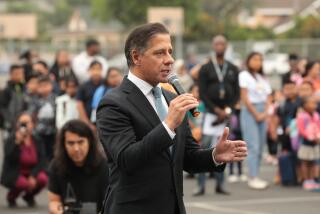Echo Park parents, rich and poor, joined forces to honor teacher picket line

Parents at Elysian Heights Elementary speak proudly of its longstanding culture of civic-mindedness: the after-school art and music classes taught on a volunteer basis. A curriculum that stresses concepts of social justice and community. The mascot, a stray tabby cat fed and nurtured by students in the 1950s.
It’s a culture that has motivated parents who can afford private education to send their children to this Title I school in the heart of Echo Park.
For them, supporting public education is a matter of moral obligation, especially in a neighborhood that has become whiter and wealthier over the past two decades.
Perhaps it is no surprise, then, that just 19 of Elysian Heights’ 300 students showed up for class on Monday, the first day of the Los Angeles teachers’ strike. A tight-knit network of parents — working, stay-at-home, spanning the socioeconomic spectrum — came together to ensure that every student would have access to free childcare and food even if they stayed away during the strike.
“This is a microcosm of the bigger picture,” said LeTania Kirkland Smith, president of the Elysian Heights Parents Assn. “We need to support our teachers and we need to support every child, not just our own children.”
When it became clear that teachers in the Los Angeles Unified School District would strike for fair wages, smaller class sizes and less testing, Kirkland Smith and other parents began exploring ways to make observing the picket line work for every family. It’s a show of solidarity that, like striking without pay, requires sacrifice; daycare and babysitters are costly, and many Elysian Heights families operate on tight budgets. More than two-thirds of the student body received free or reduced-price lunch in 2017, according to the California Department of Education.
The parents association sent an email blast of childcare options to families, including free day camp offered by L.A. Recreation and Parks. Stay-at-home parents formed small childcare co-ops. And Irene Peña, 58, whose granddaughter is a kindergartner at Elysian Heights, organized free playgroups at El Centro Del Pueblo, a neighborhood community center.
When Peña considers the possible origins of Elysian Heights’ social activism, she thinks of the mutual aid societies that sprang up in Southern California in the 1950s to help Spanish-speaking immigrants who were discriminated against overcome their many challenges.
“This is how the Latino community responds to crises,” said Peña, a former L.A. Unified elementary school teacher.
The school’s demographics have shifted over the past decade, as Echo Park became an increasingly desirable neighborhood and some longtime residents were displaced by rising rents.
Elysian Heights was 80% Latino and 10% white in the 2013-14 school year. In 2017, about two-thirds of students were Latino and one quarter were white.
Meanwhile, class sizes have ballooned while the hours and the number of support staff have been cut. Teachers at Elysian Heights, like many across the district, work overtime to compensate for those losses.
Zulma Mena has witnessed the swift contraction of resources. When her older son first started at Elysian Heights in 2006, each teacher taught about 20 students, and the school had a full-time librarian and a nurse.
Now her daughter Ziany is among 35 in her fifth-grade class. The librarian is part-time and when she’s not there, students can’t use the library. There’s a nurse, but only on Fridays.
Still, parents say, Elysian Heights has much to offer, thanks to its dedicated teachers.They lead after-school sports and theater classes for no extra pay. And they somehow find the time, Mena said, to communicate with parents regularly.
“My daughter’s teacher has been letting me know when she does something good,” Mena said. “She has a lot of self-confidence now.”
And the school’s teachers instruct with intent. All grades participate in a unit on peacemakers, in which they learn about leaders across disciplines — physicist Stephen Hawking, Latino civil rights activist Sylvia Mendez — who have stood up for what they believe in.
The unit culminates in a student-run project to raise money for a cause. Last year, kindergartners sold fruits and vegetables from their home gardens in a farmers market they organized to help endangered species.
Parent teamwork helps create the nurturing environment and fill in the gaps. They organize pancake breakfasts and movie nights to raise money for extracurriculars. They’ve also held silent auctions in recent years, in part due to a new wave of well-heeled families connected to local businesses willing to donate goods and services.

Tempany Deckert Donovan is among those who could have sent her kindergartner to one of L.A.’s status-symbol private schools. Her home is just down the street from Elysian Heights, but she had heard rumblings that it just wasn’t a great school. And on paper, that might seem like the case: In 2018, just 20% of students met the state standard for math while 31% met the standard for English.
After she toured the school and learned of its social-justice bent, she was convinced otherwise.
“It’s just a special place,” said Deckert Donovan, who teaches novel writing at UCLA Extension.
The evolving socioeconomic makeup of the school is something Mena, who works the night shift as an athletics equipment manager for a community college, thinks about often. When the Echo Park native began running the student center in 2016, she quickly learned that many Latino and working-class families felt that wealthier students — most of them white — received more attention because their parents could be more present at the school. They had anxieties around not being able to donate as much time and resources as they’d like to.
“Now we’re trying to engage with them,” Mena said, “make sure everyone is included.”
During the strike, this has meant making sure all school families have ways to signal support for the teachers. It has meant providing breakfast and lunch to students who depend on the school’s free meals. Parent Christine Louise Mills, a documentary filmmaker, has coordinated this effort.
There was so much extra food on Wednesday morning that demonstrators, in red rain gear, offered a loaf of sourdough bread to every parent dropping off a kid at the school.
It was a simple gesture, Mills said, but one she hopes sent an important message: “You’re still a part of this.”
laura.newberry@latimes.com | Twitter: @LauraMNewberry
More to Read
Start your day right
Sign up for Essential California for news, features and recommendations from the L.A. Times and beyond in your inbox six days a week.
You may occasionally receive promotional content from the Los Angeles Times.







